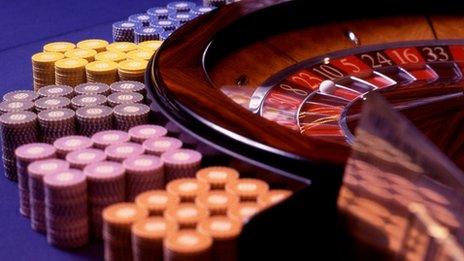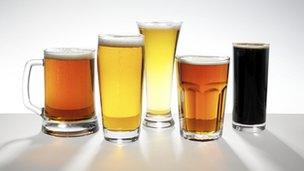Gambling and alcohol addiction linked, report says
- Published

Both gambling and alcohol activate similar areas of the brain, researchers say
Gambling and alcohol addiction share greater similarities than previously realised, a new report claims.
Alcohol Concern Cymru and the Royal College of Psychiatrists (RCPsych) in Wales claim alcohol and gambling issues can be dealt with side-by-side.
The report says one in six respondents to a survey who sought help for alcohol misuse admitted they had also experienced problems with gambling.
It urges restrictions to prevent both problems becoming worse.
The report, called A Losing Bet?, external claims there are "parallels" between gambling and alcohol, including the way the rules governing both industries have been relaxed in recent years.
It also says more females are being targeted in marketing campaigns.
The report calls for:
More research into treatment of gambling problems and the effects of curtailing gambling opportunities
Wide access to treatment for alcohol and gambling problems
Greater protection for children and young people against potentially addictive products
A national database "to capture the scope of problems associated with gambling"
The organisations claim that from a "snapshot" survey of 66 people, one in six respondents who had sought help for alcohol misuse admitted they had experienced problems with gambling.
The joint report also says 94% of respondents agreed that addiction treatment services should consider providing treatment for gambling addiction.
It argues that public health practitioners who encounter problematic gambling "can learn lessons from approaches adopted in the alcohol field to limit alcohol misuse and protect communities from harm, including imposing tougher restrictions on marketing, and decreasing availability".

More research is available on alcohol problems than gambling, it is claimed
Mark Leyshon, policy officer for Alcohol Concern Cymru, said: "Both alcohol misuse and excessive gambling can be regarded as significant public health problems, with adverse consequences to individuals and the wider society.
"There has been a wealth of research in recent decades that provides evidence of potential solutions to reducing alcohol misuse.
"Gambling research is much further behind, possibly because the concept of gambling as an addiction is a relatively new one.
"It is likely, however, that mechanisms proposed in the alcohol field, such as restricting the availability of alcohol, tightening marketing rules, and providing tougher measures to protect the young, may be equally effective in curtailing problematic gambling."
He added: "Without the necessary restrictions, there is a real danger that this will be matched in future by more people suffering alcohol and gambling problems."
Dr Raman Sahkuja, chair of the RCPsych in Wales' Faculty of Addictions, said: "Pathological gambling appears to share symptom similarities with addiction.
"Research evidence has also shown how those people with gambling addiction have a much higher activation of the reward areas in the brain than those without, and these are similar to the areas of the brain that are involved in alcohol use disorders."
He added: "It is vital that access to appropriate advice and treatment is available and well-funded, especially when considering that often people with alcohol problems participate in unhealthy gambling, and vice versa."
Prof Jim Orford of Gambling Watch UK said the organisation "fully endorses" the report's recommendations.
He said: "Problem gambling is now as prevalent as the problematic use of illicit drugs, but gets minimal attention by comparison. We need to start taking it far more seriously."
- Published11 February 2013
- Published11 February 2013
- Published29 January 2013
- Published10 January 2013